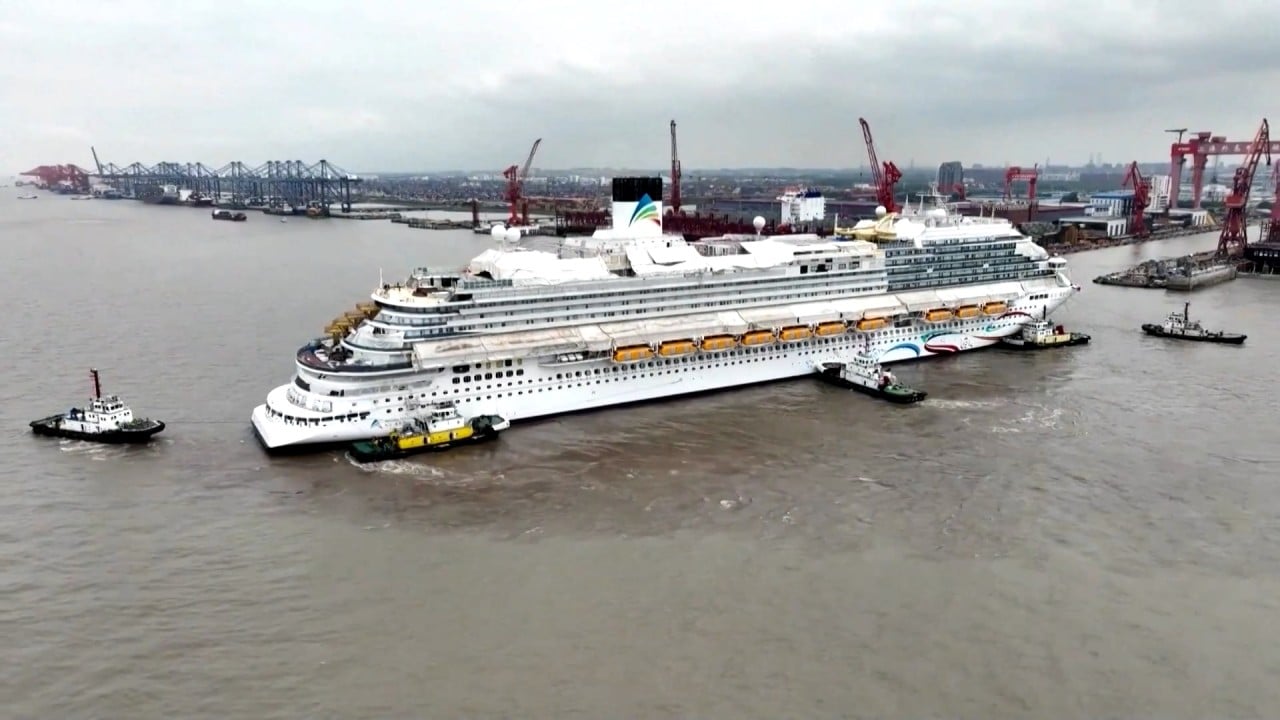
China, South Korea vie for advanced shipbuilding orders as battle of the supertankers heats up
- QatarEnergy will pay China State Shipbuilding Corporation billions of US dollars for 18 tankers in deal hailed as industry’s biggest shipbuilding contract ever
- Analyst says ‘South Korea is really worried’ as more sectors appear to be going China’s way
China’s state-owned shipbuilder has been contracted to build a fleet of massive tankers for a Qatari oil and gas operator in a multibillion-dollar deal that further challenges South Korea’s dominance in the high-end shipping sector.
The order by QatarEnergy will see the China State Shipbuilding Corporation (CSSC) make 18 tankers with individual capacities of 271,000 cubic metres – 57 per cent larger than normal vessels that transport liquefied natural gas (LNG), CSSC said in a statement on Monday.
It added that the historic deal “symbolises China’s rapid advances in the research, development and capability for building ultra-large LNG tankers”, and those advances are “moving [China] toward a goal of leading the world”.
Saad Sherida al-Kaabi, CEO of QatarEnergy and also the minister of state for energy affairs, said at Monday’s deal-signing ceremony: “With a total value of almost US$6 billion for these ultra-modern, largest-ever LNG vessels by size, the agreement we signed today is the industry’s largest single shipbuilding contract ever.”
‘Unacceptable and upsetting’: South Korea laments lost edge to China in key tech
South Korea has long been known for making some of the world’s most advanced sea vessels, including LNG carriers and passenger cruise liners.
“South Korea is really worried,” said Alicia Garcia-Herrero, chief economist for the Asia-Pacific region at French investment bank Natixis. “Too many new sectors are going China’s way.”
Korea’s Ministry of Trade, Industry and Energy said in early April that its country retook the title of world’s largest shipbuilder from China in the first quarter of 2024, in terms of new global orders, after losing it for three years. It cited orders for “eco-friendly and high-value-added ships” as a reason for the recent gain.
QatarEnergy needs tankers to ship LNG found in the Middle East nation to consumers overseas, including China. A Qatar-built LNG tanker called Q-Max has a capacity of 266,000 cubic metres, larger than the norm for similar vessels.
The energy firm announced in February an expansion of LNG production capacity with a target of 142 million metric tonnes per year by 2030 – up from 77 million metric tonnes per year now, according to S&P Global Commodity Insights.
QatarEnergy said rising global demand for LNG was behind the company’s push to expand.
According to CSSC, the freshly ordered ships will be 344 metres long, 53.6 metres wide, and 27.2 metres deep. QatarEnergy said eight of the 18 vessels will be delivered from 2028-29, and the remaining 10 will come in 2030-31.
The massive tankers that China will make for Qatar will deliver gas to import markets relatively fast because of their greater size, said Liang Yan, chair professor of economics at US-based Willamette University.
“It’s really a matter of increasing the time or efficiency of getting the LNG exported,” she said, expecting some of those shipments to reach China.
China’s demand for LNG imports may double over next decade: Cheniere Energy
Beijing-based CSSC, the world’s biggest firm of its kind since a 2019 merger, has a keen eye on making more vessels for export, Liang said.
South Korean shipbuilders HD Hyundai Heavy Industries, Hanwha Ocean and Samsung Heavy Industries are expected to earn US$9 billion for as many as 40 LNG tankers serving Qatar, industry research publication The Maritime Executive said last year.
LNG tanker production creates jobs in parts of South Korea and it is “politically significant for the national economy”, said Leif-Eric Easley, a professor of international studies at Ewha Womans University in Seoul.
“South Korea’s shipbuilding industry is part of its national identity as a peninsular country that rapidly modernised with export-led development,” Easley said.


